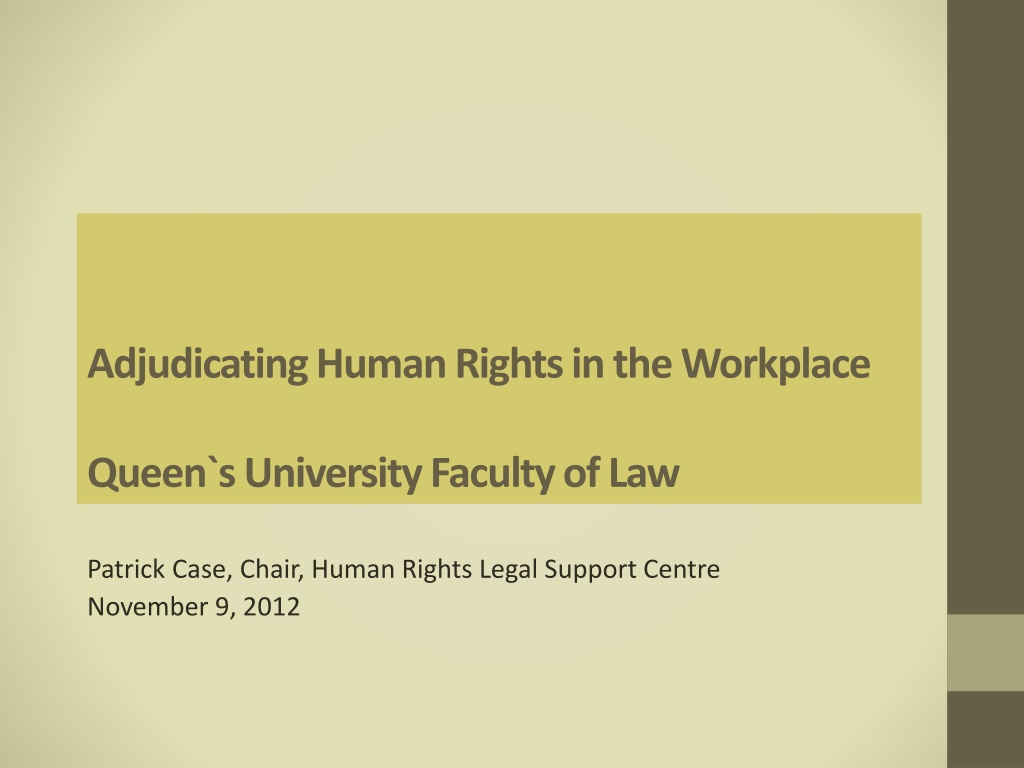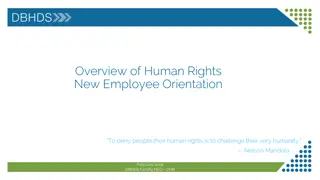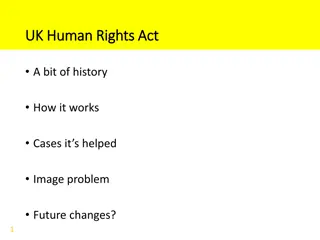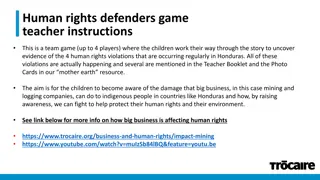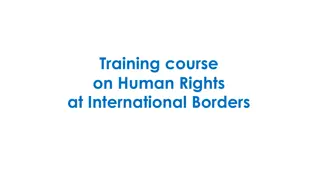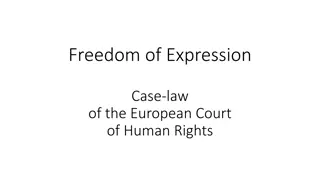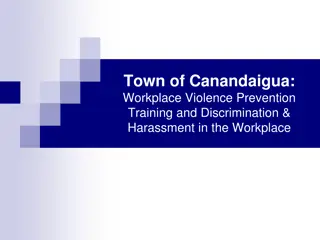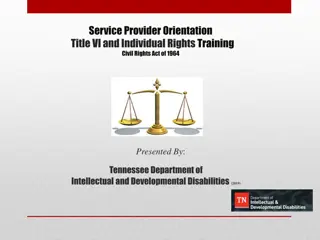Adjudicating Human Rights in the Workplace: Report on HRLSC Services
Queen's University Faculty of Law's Patrick Case chaired the Human Rights Legal Support Centre's report, detailing the assistance provided in 2011/12, including inquiries, new individuals served, and representation at various stages of proceedings. The report highlights the range of services offered by the HRLSC, enforcement of HRTO orders, systemic discrimination, and public interest remedies achieved, along with key challenges related to the demand for services.
Download Presentation

Please find below an Image/Link to download the presentation.
The content on the website is provided AS IS for your information and personal use only. It may not be sold, licensed, or shared on other websites without obtaining consent from the author. Download presentation by click this link. If you encounter any issues during the download, it is possible that the publisher has removed the file from their server.
E N D
Presentation Transcript
Adjudicating Human Rights in the Workplace Queen`s University Faculty of Law Patrick Case, Chair, Human Rights Legal Support Centre November 9, 2012
HRLSC in the Pinto Report: Snapshot of Service Numbers for 2011/12 18,968 individuals were assisted by the HRLSC in 2011/12. 25,276 inquiries. Of these, 12,562 were new individuals who sought and received advice in relation to a potential Code violation. 2,399 new individuals received in-depth services from HRLSC lawyer in 2011/12. Report notes that this compares favourably to # of new applications filed at HRTO in 2011/12: 2,740. Provided representation in almost 600 applications proceeding before HRTO, for at least one stage of the proceeding: filing, mediation or hearing. Settled 85% of applications where represented at mediation. Retained for hearing in 219 applications; settled 102 at pre-hearing stage; attended approximately 90 hearings, settling another 1/3 through mediation/adjudication at beginning of hearing. 2
HRLSC in the Pinto Report: Range of Services The Report recognizes range of services provided by HRLSC: Early intervention with a potential respondent to resolve a dispute or settling a claim before filing an application Assistance in completing the application process Representation at summary hearings to prevent early dismissal Assistance in self-representing at mediation or hearing Representation at mediation or hearing Representation at reconsideration or judicial review 3 Enforcement of HRTO Orders
HRLSC in the Pinto Report: Systemic Discrimination & Public Interest Remedies The Report notes that the HRLSC has a good track record in achieving public interest remedies at hearings and mediations. HRLSC is working with and representing community-based advocacy organizations, including groups representing migrant farm workers, injured workers, Aboriginal communities and psychiatric survivors. HRLSC is representing in a number of cases alleging racial profiling or systemic barriers tied to race or place of origin, including cases against the police and school boards. Notable public interest remedies in HRLSC settlements that are not subject to gag clauses: A G20 protestor who was roughed up by the Toronto Police - Negotiated compensation and an agreement that allows applicant to continue to speak publicly about his mistreatment by police. A transgendered student who won a new set of policies at Toronto District School Board The settlement covers privacy issues, student records, field trips and washroom facilities, as well as an agreement on extensive staff training. 4 Prison inmates with disabilities without access to their own assistive devices Settlement with Ministry of Correctional Services included staff training and a complaints procedure.
HRLSC in the Pinto Report: Key Challenge The Report acknowledges that: Demand for HRLSC services outstrips resources Challenging to find the right balance between providing legal assistance to applicants and providing full representation HRLSC use of service criteria is consistent with recommendations of Cornish and LaForest reports It is legitimate to decline to provide representation where a claim lacks merit or where an applicant has significant financial resources The HRTO process is designed to be accessible. Unrepresented applicants proceed before Tribunal and many win. But the Report concludes that: Number of self-represented applicants is too high. 5
HRLSC in the Pinto Report: Expanding our Service Capacity The Report recognizes what the HRLSC has done to expand its services: Placement of HRLSC lawyers in legal clinic offices in Ottawa, Thunder Bay, Sault Ste. Marie/Sudbury, Guelph, Windsor Intensive legal education program with Osgoode Law Faculty: 6 students full time assisting with initial intake and at mediations and hearings Pro bono lawyers panel: Volunteer lawyers take about 30 mediations a year and achieve a good rate of settlement Training and support for legal clinics litigating human rights issues at HRTO or other tribunals 6 Partnerships with Student Legal Aid programs to provide application assistance and representation at mediation.
HRLSC in the Pinto Report: Realistic Analysis of Representation Levels The Report recognizes that many unrepresented applicants before the Tribunal have never approached the HRLSC for service despite our phone # on HRTO Application. In fact, approximately 40% of unsuccessful applicants have never contacted the HRLSC. The other 60% of unsuccessful applicants contacted the HRLSC. About 1/6 received HRLSC representation. Almost all the remaining group of unsuccessful applicant received a legal assessment of their claim that concluded that their application would be non-jurisdictional, unsupported by evidence/law or was otherwise not sufficiently meritorious to be eligible for free legal representation. Small number of the 60% rejected our service because they did not accept our assessment of damages etc. Usefully, the Report recognizes that it is a myth that all complainants received public representation under the former human rights system. 7
HRLSC in the Pinto Report: Assisting self-represented applicants The Report notes that 44% of self-represented applicants are successful at hearing and rejects the concept of gatekeeping in the new system. One thing not highlighted in the Report: the vast majority of successful self- represented applicants were assisted by the HRLSC in preparing and litigating their claim. The Report recognizes that HRLSC lawyers have provided in-depth assistance to approximately 2,400 applicants annually, while proving representation in filing or at mediation or hearing in a much smaller number of applications (approx. 600 per year) Taking you more deeply into the numbers, our analysis of 10 months of Tribunal decisions demonstrated that over 85% of successful self- represented applicants had received legal assistance from the Centre. 8
Would the HRLSC like to represent more applicants at mediation and hearings? Yes. Our resources do not match the demand. What are the options? Provide less lawyer assistance to self-representing applicants? Divert resources from our telephone advice line? Reduce the number of lawyers and hire more paralegals? Triage model our lawyers (or paralegals) interview every applicant with a possibly meritorious claim. We try to identify and represent every applicant who wants representation and has an arguable case. But we prioritize service to those with the greatest challenges in self-representing. We are proud of the fact that we have provided assistance to the vast majority of self-representing applicants who win at their hearings. But we are perhaps even more pleased when we can represent and win. 9 Hard to find good options within current resources.
Specific Pinto Recommendations for HRLSC: Telephone Advice Service Reduce telephone wait times to levels that are consistent with comparable public service organizations. Advise and update callers on hold on the telephone about wait times. _______________________________________________________________ Response rate on incoming calls has increased from a low of 50% to a current rate of 84% in this fiscal year. Wait times in this fiscal year are averaging six minutes. Room for improvement; this is better than LAO advice service Callers on hold now get information on place in queue. Also can go to website to monitor place in queue. 10
Pinto Recommendations for HRLSC: Wait Times for Non-urgent Interviews Reduce wait times to less than 30 days for initial interviews by a Human Rights Advisor for non-urgent inquiries. __________________________________________________ Interviews within two weeks for callers with filing deadlines, summary hearings, mediation and hearing dates. If caller wants to file an application and no looming limitation period or other urgency, the interview wait time is currently 2-3 months. We recognize that this is unacceptable; hard to address without reducing representation levels. We are currently using some unexpected vacancy savings to re-deploy staff (and hire temporary backfill staff) to keep the wait from growing. We provided the Review with a financial plan to reduce the wait time for non-urgent interviews to one month: the cost would be less than $600,000 to hire a team of paralegals to do initial interviews. 11
Pinto Recommendations for HRLSC: Duty Counsel Program for Mediations Reinstitute Duty Counsel service to assist Applicants at mediation in Toronto and if possible in HRTO Regional Centres ________________________________________________________ We would like to provide more representation at mediation. We developed Duty Counsel pilot project in our first year but had to cut it when our lawyers started to carry a full litigation load. Example of tough choices that we have to make in delivering service. Our Duty Counsel program achieved a good settlement rate and was highly efficient. However in some cases we were giving legal assessments that mirrored what the Vice Chair was delivering in the mediation room. Was this the best use of our resources? Does it reduce our capacity to take systemic cases or to prioritize cases based on merit and greatest need? 12
Pinto Recommendations for HRLSC: Expand regional staff placed in clinics HRLSC should expand the placement of staff in community legal clinics outside Toronto __________________________________________________ Currently lawyers in Ottawa (half time); Sault Ste. Marie/Sudbury (full time); Thunder Bay (full time); Guelph (full time) and Windsor (full time). Open to moving more positions outside Toronto. Windsor was added in the past year. Moving another position to Peel this year. We have applied for Law Foundation funding to add an Aboriginal outreach worker in Thunder Bay (with Kinna-aweya legal clinic). Board recognizes regional staff as a priority but there is no special infrastructure funding for this. 13
Pinto Recommendations for HRLSC: Better communication; more collaboration with Commission and Tribunal Three human rights agencies should meet regularly to focus on better coordination. ____________________________________________________ We agree that there is room for improvement here. HRLSC has initiated meetings with Commission staff and meetings between our Board and the Commissioners. Some particular areas that may call out for better coordination Public legal education materials on discrimination and human rights process Self-help tools for self-representing parties Community outreach in marginalized communities including Aboriginal communities (OHRC and HRLSC). 14
Pinto Recommendations for HRLSC: Increase Engagement of Aboriginal Persons The HRLSC should coordinate with Commission to increase engagement of Aboriginal persons in the human rights system __________________________________________________ Making our service accessible to Aboriginal communities is a priority. We have made effective use of Aboriginal media to make our services more visible. Coverage of HRLSC cases in Wawatay News, Aboriginal Peoples T.V., Turtle Island News, First Perspective etc. HRLSC has a service policy aimed at ensuring culturally appropriate service for Aboriginal persons. We facilitate requests from Aboriginal members of the public for service by one of our Aboriginal staff lawyers. Pending funding application with Kinna-aweya clinic for an Aboriginal Community Outreach Worker in Thunder Bay. HRLSC would like to expand its services in Aboriginal and northern communities but would also be pleased to support or partner with an Aboriginal organization in delivering human rights legal services. 15
Pinto Recommendations for HRLSC: Increased Funding MAG should in the near term increase funding for the HRLSC significantly so the HRLSC can better fulfill its statutory mandate. ___________________________________________________ Enhanced capacity could be relatively inexpensive. The least expensive option is more paralegals. If our lawyers could do fewer triage interviews, they could provide more representation. More representation at mediation would save the whole system money. Our settlement rate is about 20% above HRTO average. As noted above, we provided the Review with a financial plan to reduce the wait time for non-urgent interviews to one month: the cost could be approximately $600,000 to hire a team of paralegals to do initial interviews. But note that the HRLSC is operating on 2008/9 dollars, with no increases to base funding since opening our doors, including for salary increases. Not sustainable. 16
